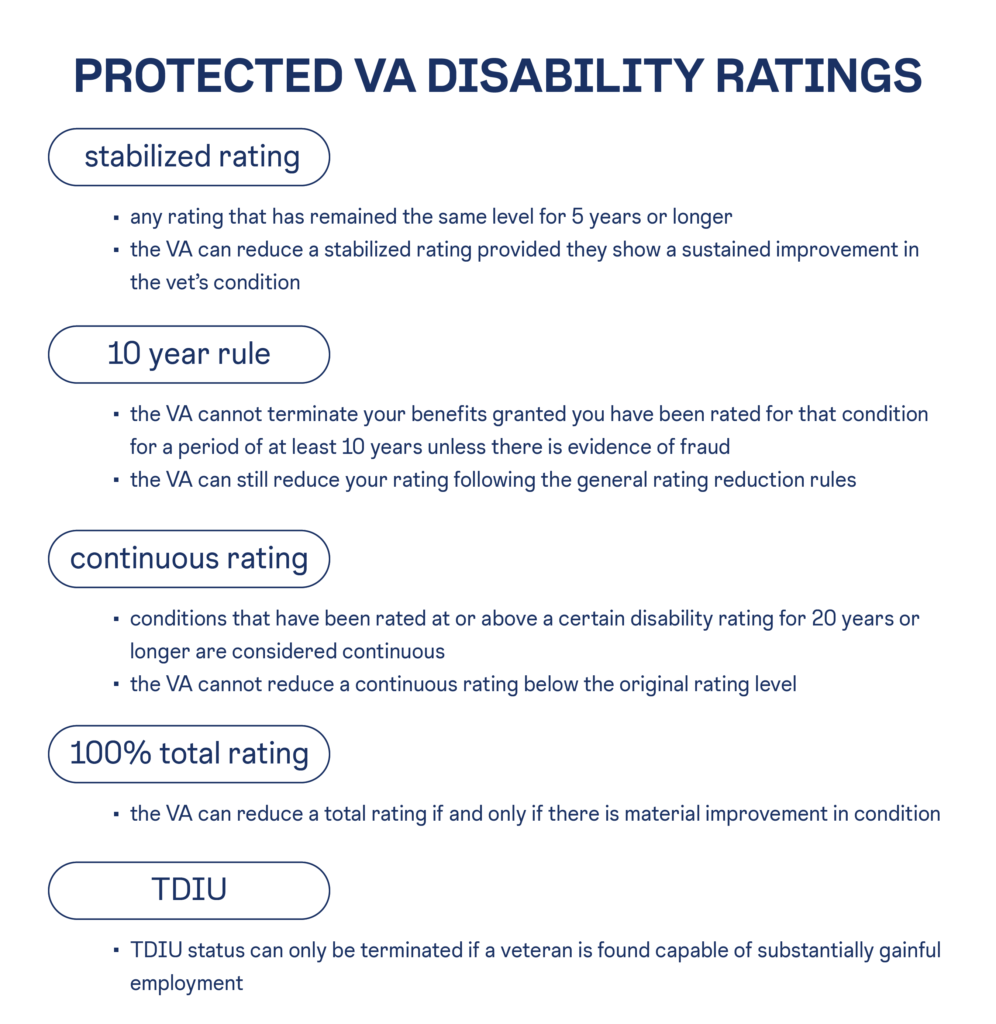The Department of Veterans Affairs (VA) provides disability benefits to veterans who have suffered physical or mental injuries during their service. These benefits aim to compensate for the negative impact of these injuries on their daily lives. However, some veterans may find themselves in a situation where the VA lowers their current disability rating. This can have significant consequences, as it could result in reduced benefits and a loss of financial support. Understanding the reasons behind these rating reductions and how to navigate this process is crucial for veterans to protect their disability benefits.
What is a VA Re-Examination and Reevaluation?
A VA re-examination, also known as a reevaluation, is a medical assessment conducted by the Department of Veterans Affairs (VA) to review and reassess the severity of a service-connected disability. When an individual is initially granted disability benefits by the VA, there are certain cases where the nature of the disability suggests the possibility of improvement over time. In such instances, the VA may schedule a future re-examination to determine if the disability has changed and if adjustments to the benefits are necessary.

The purpose of the re-examination is to assess whether there have been any significant improvements or worsening of the service-connected disability. This evaluation helps the VA ensure that disability benefits accurately reflect the current level of impairment and provide appropriate compensation and support to veterans. By reassessing the disability, the VA aims to maintain fairness and accuracy in the disability rating system.
If you are selected for a re-examination, the VA will send you advance notice with details about the scheduled appointment. It is crucial to attend this examination as it plays a vital role in determining the ongoing eligibility and compensation for your disability benefits. Failing to attend the re-examination without rescheduling or providing a valid explanation may result in the reduction or termination of your disability benefits.

If selected for re-examination, it is absolutely crucial to attend as failing to do so without rescheduling or providing a valid explanation may result in the reduction or termination of your disability benefits.
It is important to note that not all service-connected disabilities are subject to re-examination. Generally, conditions that are expected to improve over time, such as certain injuries or illnesses, are more likely to undergo reevaluation. On the other hand, disabilities that are considered permanent and unlikely to change substantially, such as loss of limb or blindness, may be less frequently subject to re-examination.

Can the VA Lower Your Disability Rating?
Yes, the VA has the authority to reevaluate and potentially lower a veteran’s disability rating. The VA periodically reviews ratings to ensure accuracy. If improvement is found or the original rating was incorrect, the rating can be reduced. Veterans have the right to appeal and should seek assistance if needed.
Service-Connected Disability Ratings That Are Protected
When a disability is service-connected, meaning it was caused or worsened during active duty, certain disability ratings are protected and less likely to be reexamined by the VA.
Veterans with a permanent and total rating, indicating the disability is unlikely to improve, generally have their status rarely reevaluated. Similarly, injuries that are considered permanent or static, meaning they are enduring and unchanging, are also less likely to be subject to reexamination. However, certain diseases that are not considered permanent may still be subject to reconsideration.
What are Protected VA Disability Ratings?

Protected VA disability ratings refer to certain categories of disability ratings that are safeguarded from reduction or termination by the Department of Veterans Affairs (VA) without meeting specific criteria. These protected ratings provide veterans with a level of security and stability in their disability benefits. Here are the seven categories of protected VA disability ratings:

1. Static Disability
The disability has shown no material improvement for five years or more.

2. Permanent Disability:
The disability is of such a nature that it is unlikely to improve.

3. Disability in Place for 10 Years:
The disability has been in effect for ten years or more. However, the rating can still be reduced if there is evidence of improvement.

4. Disability in Place for 20 Years:
The disability has been continuously in effect for 20 years or more.

5. Age 55 or Older:
The veteran is over 55 years of age, except in unusual circumstances or as required by regulation.

6. 100% Total Disability Rating:
The veteran has a 100% disability rating deemed as total, and the rating can only be reduced if there is evidence of material improvement.

7. Rating at the Schedular Minimum:
The disability is rated at 10% or less, or the combined evaluation would not change even if the VA reevaluation resulted in a reduced evaluation for one or more disabilities.
These protected ratings provide veterans with assurance that their disability benefits are less likely to be reduced or terminated without meeting specific requirements based on the duration, nature, or severity of their disability.
Notice of Reexamination Letter

When the VA intends to change your service-connected disability rating, they will send you a Notice of Reexamination letter. This letter will outline the process and timing of the reexamination.
If you disagree with the VA’s decision, you have 30 days to request a hearing and 60 days to submit evidence to support maintaining your current rating. If you fail to attend a scheduled hearing, the decision-making process will proceed based on the existing evidence. However, the court may advise you that you can request a new hearing, and any new evidence presented will be considered in reviewing the previous rating adjustment.

If you receive a Notice of Reexamination letter and disagree with the VA’s decision, you have 30 days to request a hearing and 60 days to submit evidence to support maintaining your current rating.
If you miss your appointment or fail to provide evidence for your claim, the VA may lower or terminate your disability payments. It may take time and be challenging to reinstate your rating, depending on the circumstances. Importantly, the VA cannot reduce your service-connected disability rating without first notifying you.
When can the VA reduce my disability rating?
The VA can reduce your disability rating following a reexamination if they determine that there has been improvement in your condition since your last examination. The outcomes of a reexamination can be as follows:

1. Benefits rescinded:
If the VA finds that you no longer have symptoms that qualify you for compensation, your benefits may be terminated.

2. Rating reduced:
If there has been improvement in your disability since the last examination, the VA may lower your rating.

3. Rating remains the same:
If your symptoms and severity have remained unchanged since the last examination, your rating will likely stay the same.

4. Rating increased:
If there has been an increase in the symptoms and severity of your disability, the VA may raise your rating.
If the VA decides to reduce your rating, they will provide a decision stating the effective date of the change and whether it will impact your monthly benefits payment. If your rating is increased, you typically will not receive back pay for the change. If your rating is decreased, you usually do not have to repay any benefits already received.
If the VA proposes to reduce your rating, they are required to notify you and provide an opportunity to contest the reduction. You will have 60 days to submit arguments and evidence against the reduction, and you can also request a hearing within 30 days of the notification. The hearing will be conducted by VA personnel who were not involved in the decision to reduce your benefits.
After reviewing your evidence and arguments, the VA will issue a final decision. If you disagree with the decision, you have the option to file an appeal.
FAQs
1. Can the VA Lower Your Current Disability Rating?
A: Yes, the VA has the authority to reduce your current disability rating.
2. What are disability benefits?
A: Disability benefits are compensation provided by the VA to veterans with a service-connected disability.
3. Can the VA reevaluate your disability rating?
A: Yes, the VA can reevaluate your disability rating periodically.
4. What happens if the VA reduces your disability rating?
A: If the VA reduces your disability rating, it may result in a decrease in your disability benefits.
5. Do veterans with a protected rating receive a VA reexamination notice?
A: Veterans with a protected rating do not receive a VA reexamination notice unless there is a significant change in their condition.
6. Can the VA reduce my disability rating without any reason?
A: No, the VA cannot reduce your disability rating without sufficient reason and evidence.
7. Can the VA reduce your disability benefits if you have a permanent and total (P&T) rating?
A: Generally, the VA cannot reduce your disability benefits if you have a permanent and total (P&T) rating.
8. Can the VA decrease your benefits if you have a combined rating?
A: Yes, the VA can decrease your benefits if you have a combined rating and there are changes in your condition.
9. What steps should the VA take to reduce a veteran’s disability rating?
A: The VA must show that there has been an improvement in the veteran’s condition or that the original rating was based on a mistake or fraud.
10. Can the VA Lower Your Current Disability Rating?
A: Yes, it is possible for the VA to lower your current disability rating if they determine that your condition has improved or if they find evidence that supports a lower rating.
11. What is a VA disability rating?
A: A VA disability rating is a measure of the severity of your service-connected disability or disabilities. It is determined by the VA based on the evidence you submit through your VA claim.
12. Can the VA reduce my rating without notifying me?
A: No, the VA cannot reduce your rating without notifying you. You have the right to be informed of any proposed rating reduction and have the opportunity to provide evidence and arguments in your favor.
13. Are all veterans with a service-connected disability at risk of having their rating reduced?
A: No, not all veterans with a service-connected disability are at risk of having their rating reduced. The VA reviews each case individually and determines if there is evidence to support a lower rating.
14. What happens if the VA reduces my rating?
A: If the VA reduces your rating, your disability compensation benefits will be adjusted accordingly. The amount you receive each month may be lower than what you were previously receiving.
15. Can the VA reduce or terminate my disability compensation benefits?
A: Yes, if the VA determines that your condition has improved to the point where you are no longer eligible for compensation, they can reduce or terminate your disability compensation benefits.
Need help filling out your disability claim?
Do you need assistance with completing your disability claim? Look no further than Vet Claim Solutions. Our team of experienced vet coaches is here to help guide you through the process and ensure that your claim is filled out accurately and thoroughly. We understand the complexities of these claims and are dedicated to providing personalized support to veterans like you. With our expert assistance, you can have peace of mind knowing that your disability claim is being handled with utmost professionalism and care. Let us help you get the compensation you deserve.


